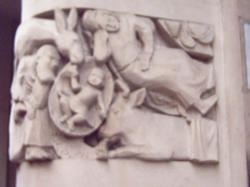The church goverment remains wholly volentary and although heirachically structured, is essentially egalatartian reflecting the harmony of paradise. All members of the GUC are encouraged to become members of the clergy and church governing body. The ecleastical structure of the church is egalatarian in nature, believing that each individual has the right to determin how best to live their life. Following this principal, each congration is allowed the same right being self governing and independant from the mother church. The structure of the church governance is based upon models left by the first century church. The new members, called Belivers, are those who have embraced the creed and wish to join in fellowship with the greater church. Once babtised into the church they then are called the Perfecti. From the Perfecti are chosed Decons, who are those who have chosen to serve the congragation in practical and administrative capacaticities. From the Decons come Priests, those who have fulfiled the nessary preprations and recieve the anointing, thereby recieving ordination as a minister. Priests chose a field of minestry that they wish to follow, and deticate themselves to this role of ministering to others. Priests may form healing ministries, fellowships, congragations and orders within the church. From the priesthood, are selected Bishipos. Bishops are the overseers, and oversee congragations and fellowships, in practical and administrative roles. From the Bishops come those who have a desire to devote themselves to the church and its missions, these are called as Deciples. Also from the Bishops are those who are called to become prophits, the Prophits oversee the cultivation, preparation and administration of the sacraments and sacramental substances. Elected by the assembled Bishops, Diciples and Prophets are chosen the Apostels. Apostels have chosen to deticatate their lives to the missions of the church and are official spokespersons for the church.
"Christians, more than all people, are not allowed to correct by force the faults of those who sin [miss the mark ro target; ed.]... the wrongdoer must be corrected not by force, but by persuasion... God rewards those who abstain form evil out of their own choices, not out of necessity... [not] by force, nor restrained by fear... We do not have authority over your faith, beloved, nor do we command these things as your lords and masters. We are appointed for the teaching of the Logos, not for power, nor for aboslute athority. We hold the place of counselors to advise you. The counslor speaks his own opinions, not forcing his listener, but leaving full master of his own choice in what is said."
- Bishop John Chrysostom C.E. 397
